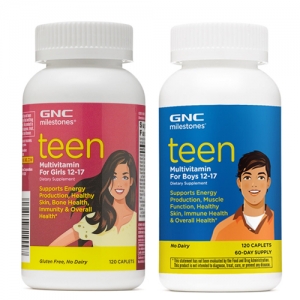The ideal study population
Researchers randomly selected 14,641 male physicians to receive a daily
multivitamin-mineral supplement or placebo for approximately 11 years. The
physicians were 50 years or older, and 9% had a previous history of cancer.
Other factors, including age, height and weight, tobacco and alcohol use, diet,
other medications, and family history of cancer were similar in the supplement
and placebo groups.
The multivitamin provided around 100% of the daily value for most essential
vitamins and minerals, with a few exceptions. It contained no iron, and for
vitamins E and B12, the multivitamin provided significantly more than 100% of
the daily value. For vitamin K, biotin, calcium, magnesium, and chromium, it
provided significantly less than 100%. The supplement contained some additional
nutrients, including lutein and lycopene.
Moderate multivitamin, less total cancer
Men taking the multivitamin were diagnosed with 8% fewer cancers overall than
men in the placebo group.
There were no significant differences between the supplement and placebo
groups in terms of specific cancer types, such as prostate and colorectal
cancers. There were no significant differences in the risk of death due to
cancer between the two groups.
Finding balance
The study multivitamin was similar to "common," moderate-dose products
available in any supermarket or pharmacy. Given that past studies have suggested
multivitamins may increase cancer risk, these findings are reassuring. However,
according to lead study author Dr. J. Michael Gaziano, "It would be a big
mistake for people to go out and take a multivitamin instead of quitting smoking
or doing other things that we have a higher suspicion play a bigger role, like
eating a good diet and getting exercise."
Keep this in mind as you consider our tips on creating your own cancer risk
reduction plan:
- Be modest. Steer clear of mega-doses, and follow the American
Cancer Society's advice: eat a balanced diet, and if you take a supplement,
choose a balanced multivitamin that contains no more than 100% of the daily
value of most nutrients.
- Seek the experts. A person's diet may get out of balance for a
variety of reasons, such as illness, nutrient depletion or malabsorption caused
by a drug, medical condition, food intolerance, or allergy. If this describes
you, discuss your diet with your doctor or dietitian to identify specific
nutrients that may be missing.
- Consider context. The study population was healthy, older males,
most of whom don't smoke, and many of whom eat a balanced diet and exercise
regularly. If you smoke, are obese, or have additional risk factors for cancer,
heart disease, or other chronic disease, these findings may not apply to you.
- Get bang for your buck. Regardless of whether you take a
multivitamin, you can never go wrong by adopting basic cancer prevention
strategies: avoid tobacco, drink alcohol modestly or not at all, move regularly,
eat plenty of vegetables and fruit, use sunscreen consistently, and maintain a
healthy body weight.












